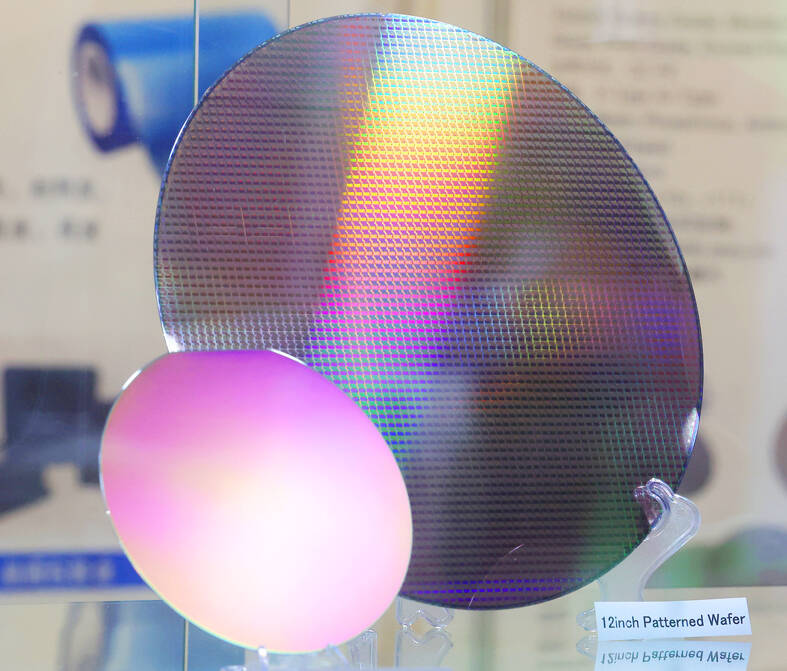A record number of exhibitors will this year attend Semicon Taiwan, an annual international trade fair in the semiconductor technology sector, when it opens on Wednesday next week in Taipei, organizer SEMI Taiwan said yesterday.
The annual event will feature more than 3,600 booths from over 1,100 exhibitors from home and abroad, the highest number since it was first held in 1996, according to SEMI Taiwan, an organization located in Hsinchu County that connects about 3,000 member companies and 1.5 million professionals worldwide to advance the technology and business of electronics design and manufacturing.
Ray Yang (楊瑞臨), an international strategy development consulting director at the government-sponsored Industrial Technology Research Institute (ITRI) and a committee member at SEMI Taiwan, said this year’s event has a theme of "Empowering AI Without Limits," and highlights the significance of silicon photonics and fan-out panel level packaging (FOPLP).

Photo: CNA
A forum focusing on silicon photonics will be held during the event, featuring experts from organizations and companies, including Taiwan Semiconductor Manufacturing Co (TSMC, 台積電), Inter-university Microelectronic Centre, and Marvell Technology Group Ltd, for discussions regarding the opportunities and challenges facing silicon photonics, Yang added.
Silicon photonics — known for its high bandwidth, low power consumption, long-distance transmission and cost-saving features — has become a hot topic in the semiconductor industry. It is estimated that the global silicon photonics market could reach US$7.86 billion by 2030.
In addition, a forum on FOPLP will also be held, with experts including those from Applied Materials Inc, Manz AG and Advanced Semiconductor Engineering Inc discussing and exploring related technological developments.
Driven by demand for 5G, artificial intelligence of things, automotive, high-performance computing and consumer products, FOPLP shows significant growth potential. According to research firm Yole Group, the market is expected to reach US$221 million by 2028, with a compound annual growth rate of 32.5 percent from last year to 2028.
Meanwhile, several TSMC senior managers, including executive vice president and co-chief operating officer YJ Mii (米玉傑), vice president of Pathfinding and Corporate Research Min Cao (曹敏), vice president of Advanced Packaging Technology and Service Jun He (何軍) and director of Advanced Packaging Business Development Jerry Tsou (鄒覺倫), will deliver speech at different forums during the event, Yang said.
He added that there will be 13 country sections at this year’s exhibition, with France, Malaysia and the Philippines new additions to the list.
Semicon Taiwan will take place from Wednesday to Friday at the Taipei Nangang Exhibition Center.

STEEP DECLINE: Yesterday’s drop was the third-steepest in its history, the steepest being Monday’s drop in the wake of the tariff announcement on Wednesday last week Taiwanese stocks continued their heavy sell-off yesterday, as concerns over US tariffs and unwinding of leveraged bets weighed on the market. The benchmark TAIEX plunged 1,068.19 points, or 5.79 percent, to 17,391.76, notching the biggest drop among Asian peers as it hit a 15-month low. The decline came even after the government on late Tuesday authorized the NT$500 billion (US$15.2 billion) National Stabilization Fund (國安基金) to step in to buoy the market amid investors’ worries over tariffs imposed by US President Donald Trump. Yesterday’s decline was the third-steepest in its history, trailing only the declines of 2,065.87 points on Monday and

TAKING STOCK: A Taiwanese cookware firm in Vietnam urged customers to assess inventory or place orders early so shipments can reach the US while tariffs are paused Taiwanese businesses in Vietnam are exploring alternatives after the White House imposed a 46 percent import duty on Vietnamese goods, following US President Donald Trump’s announcement of “reciprocal” tariffs on the US’ trading partners. Lo Shih-liang (羅世良), chairman of Brico Industry Co (裕茂工業), a Taiwanese company that manufactures cast iron cookware and stove components in Vietnam, said that more than 40 percent of his business was tied to the US market, describing the constant US policy shifts as an emotional roller coaster. “I work during the day and stay up all night watching the news. I’ve been following US news until 3am

Six years ago, LVMH’s billionaire CEO Bernard Arnault and US President Donald Trump cut the blue ribbon on a factory in rural Texas that would make designer handbags for Louis Vuitton, one of the world’s best-known luxury brands. However, since the high-profile opening, the factory has faced a host of problems limiting production, 11 former Louis Vuitton employees said. The site has consistently ranked among the worst-performing for Louis Vuitton globally, “significantly” underperforming other facilities, said three former Louis Vuitton workers and a senior industry source, who cited internal rankings shared with staff. The plant’s problems — which have not

TARIFF CONCERNS: The chipmaker cited global uncertainty from US tariffs and a weakening economic outlook, but said its Singapore expansion remains on track Vanguard International Semiconductor Corp (世界先進), a foundry service provider specializing in producing power management and display driver chips, yesterday withdrew its full-year revenue projection of moderate growth for this year, as escalating US tariff tensions raised uncertainty and concern about a potential economic recession. The Hsinchu-based chipmaker in February said revenues this year would grow mildly from last year based on improving supply chain inventory levels and market demand. At the time, it also anticipated gradual quarter revenue growth. However, the US’ sweeping tariff policy has upended the industry’s supply chains and weakened economic prospects for the world economy, it said. “Now